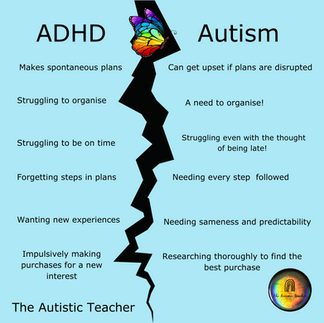
ADHD and Autism
- mandycook2021
- Jan 1, 2024
- 3 min read
ADHD and Autism often go hand in hand! According to scientific literature, 50 to 80% of autistic individuals also present with Attention Deficit Hyperactivity Disorder (ADHD). Conversely, up to 50% of those diagnosed with ADHD are also autistic. This combination is often referred to as AuDHD by the neurodivergent community.
Until 2013, when the wording in the DSM-5 was changed, a person could not be diagnosed with both ADHD and Autism despite the how common it is to have both! However, both conditions are neurodivergent neurotypes, and recent studies have shown similar brain structure differences. Some people even believe ADHD and Autism are the same thing but with different presentations.
While there are many similarities, there are also differences. Understanding these similarities and differences is crucial for individuals, their families, educators, and support networks to accommodate these unique experiences.
The Challenges of Living with ADHD and Autism
Being both autistic and ADHD can be very challenging and unique for each individual. ADHD can make it difficult to focus, control impulses, and regulate energy levels, while Autism affects communication and social interactions. When these two come together, it can feel like an internal battle!
Sensory Impact
For some people, being autistic and having ADHD can mean experiencing sensory sensitivities and seeking new sensory experiences simultaneously! This might look like wanting to go to a new place or have a new experience but then feeling overwhelmed by sensory input, such as loud noises or bright lights.
Social Situations
An AuDHD individual might want to meet people and seek social interaction but may find it challenging to navigate neurotypical social situations due to social communication and interaction differences. They might come across as 'a bit much' as they interact in a neurodivergent way, sharing special interests and knowledge, or struggling to keep up with conversation.
Executive Functioning
Another aspect to consider is the impact on executive functioning, which involves skills like organisation, planning, and flexible thinking. The autistic side might want to plan, organise and manage, but the impulsivity of ADHD might make it difficult to stick to the plan! This can lead to frustration, anxiety, and difficulties in academic, professional, and personal life.
Here are few examples of how ADHD and Autism may interact:
Makes spontaneous plans vs Can get upset if plans are disrupted
Struggling to organise vs A need to organise!
Struggling to be on time vs Struggling even with the thought of being late!
Forgetting steps in plans vs Needing every step followed
Wanting new experiences vs Needing sameness and predictability
Impulsively making purchases for a new interest vs Researching thoroughly to find the best purchase
The Positive Side of AuDHD
It's important to note that the co-occurrence of ADHD and Autism can also bring strengths and unique perspectives. Some individuals may have a keen focus on specific interests, strong problem-solving skills, creativity, and a deep understanding of patterns and systems. These strengths can be harnessed in academic pursuits, careers, and personal interests, contributing to innovation and success in various fields.
Living as an autistic and ADHD (AuDHD) person can present both challenges and strengths. It is crucial for individuals, their families, educators, and support networks to understand and accommodate these unique experiences.
If you have enjoyed my work and would like to support my mission to help the Autistic Community, feel free to buy me a coffee. Please only donate if you can afford to do so. Everything given is very much appreciated. ❤️ You can also help to spread the word by liking, loving and sharing my posts. ☺️
Thank you!



























Comments